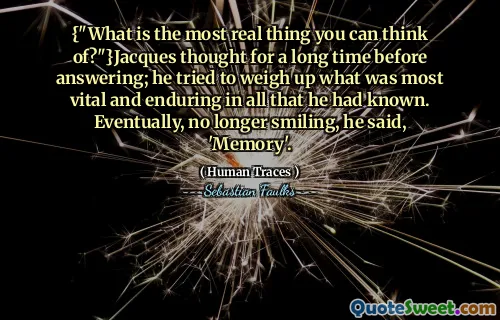They, like me, like all of us, had, once upon a time, in a past so far away it seemed like heaven, caught by chance a glimpse of an inner essence, only to forget what it was. It was this lost memory that pained us, reduced us to ruins, though still we struggled to be ourselves.
In Orhan Pamuk's "The Black Book," the narrator reflects on a collective past where everyone once experienced a glimpse of their true inner selves. This fleeting moment is described as a heavenly encounter, suggesting that it was a profound realization of identity or purpose that remains cherished yet distant over time.
However, this essential awareness has been lost, leading to a sense of sorrow and emptiness among many. The characters are left grappling with this loss, experiencing a deep pain as they strive to reconnect with their authentic selves, even as they feel increasingly fragmented and diminished by the passage of time.



